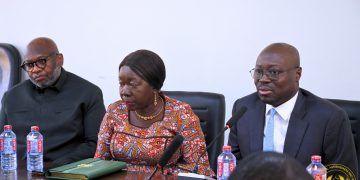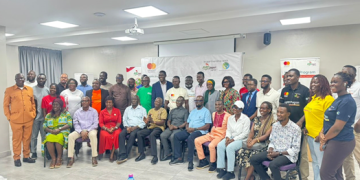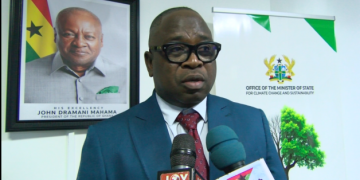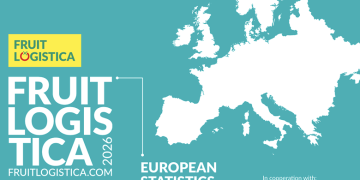Ghana’s growing digital finance ecosystem is facing a major test of confidence as industry experts warn that low levels of public trust could slow down adoption and undermine the country’s financial inclusion agenda.
Speaking at the 2025 Fintech Stakeholder Forum in Accra, key players in the financial technology and banking sectors expressed deep concern that despite the rapid expansion of mobile money and digital credit platforms, many Ghanaians still hesitate to fully engage with the system due to fears of fraud, data breaches, and inadequate consumer protection.
Held under the theme “Harnessing Ghana’s Fintech Potential: Regulatory Frameworks for Digital Credit and Digital Assets,” the forum brought together regulators, fintech firms, banks, policy experts, and academia to deliberate on how Ghana can strengthen digital payments and ensure responsible innovation in the growing fintech space.
Professor Peter Quartey, former Director of the Institute of Statistical, Social and Economic Research (ISSER) at the University of Ghana, said the country’s overall financial literacy remains “medium,” while credit usage and trust levels in digital financial services are “low to medium.”
“We still have a long way to go in terms of digital financial usage,” he cautioned. “Our surveys show that about 42% of users of mobile money services have trust issues. These days, we all see how scammers operate, and that affects confidence in the system. We need to do more to educate consumers and strengthen our security systems.”
Prof. Quartey called for a nationwide financial literacy campaign, particularly targeting rural and community banks, to build public confidence and increase responsible use of digital financial services.
“The behavior and awareness around digital finance are growing,” he said, “but without trust, the ecosystem cannot sustain its momentum. People must feel safe when transacting digitally.”
Infrastructure of trust
Adding to the discussion, Ethel Coffie, Chief Executive Officer (CEO)of Edel Technology Consulting, said the issue of trust extended far beyond individual users.
She described it as an “infrastructure of trust” that involved multiple layers from consumers and service providers to banks, regulators, and data management centers.
“There’s trust between consumers and service providers, yes, but also between banks, regulators, and even data centers,” she explained.
“It’s not just about whether customers feel safe using digital platforms it’s about whether institutions trust each other with data, compliance, and enforcement.”
Coffie noted that many digital trust conversations tend to focus narrowly on consumers, overlooking the role of small and medium enterprises (SMEs) that drive Ghana’s economy.
She urged regulators to use innovative tools such as regulatory sandboxing to support responsible digital lending for SMEs.
“SMEs are critical to our economy,” she said. “If we create a trusted digital framework that supports them, we are not just improving access we’re strengthening national development.”
Interoperability and shared responsibility
For Clara B. Arthur, Chief Executive Officer of the Ghana Interbank Payment and Settlement Systems (GhIPSS), the biggest challenge facing Ghana’s digital finance sector today is the trust deficit.
Quoting recent findings that only 42% of users trust digital finance systems, she said the figure was “worrying and unacceptable.”
“If my child brought home a score of 42 percent, that would be a problem,” she said to laughter from the audience. “It shows clearly that we have a lot of work to do.”
Arthur stressed that interoperability the ability of different systems and platforms to work together seamlessly must not only enhance efficiency but also build trust between banks, fintechs, and regulators.
“Interoperability should build trust between all players banks, fintechs, and regulators,” she said. “Without trust, we cannot sustain progress in digital credit, virtual assets, or the digital economy.”
She acknowledged that institutions such as GhIPSS also share in the responsibility for the trust deficit.
“It’s a shared 42%. It’s not just MoMo or fintechs it’s all of us,” she admitted. “We must work together to raise that number and build a financial system that users truly believe in.”
Learning from Kenya’s Experience
Drawing lessons from Kenya, Coffie cited the Central Bank of Kenya’s 10-year digital financial strategy, which links financial inclusion directly to citizens’ overall financial health.
The strategy showed that while access and literacy had improved, the average Kenyan’s financial wellbeing had declined, highlighting the need for deeper, sustained reforms.
“Kenya has gone beyond ensuring access and literacy to tracking financial wellbeing at the municipal level,” she explained. “They’ve set measurable KPIs that assess whether people are not just using digital tools, but actually benefiting from them.”
Panelists agreed that Ghana could adopt a similar data-driven approach, coupling financial literacy initiatives with broader metrics that measure citizens’ financial health, resilience, and trust in digital systems.
Restoring confidence for sustainable growth
The discussions at the Fintech Forum underscored a common concern that innovation alone is not enough to build a thriving digital finance ecosystem.
Without consumer confidence, data protection, and strong institutional collaboration, the rapid gains made by Ghana’s fintech sector could face serious setbacks.
Experts called for a comprehensive national trust framework encompassing cybersecurity,
interoperability standards, dispute resolution mechanisms, and continuous consumer education.
As Ghana continues to position itself as a leader in digital financial innovation, the message from the forum was clear: trust is the currency that will determine the future of fintech.
“Access is important, literacy is crucial,” Prof. Quartey concluded, “but without trust, the system collapses. That’s where our work must begin.”
Source:citinewsroom.com
























































